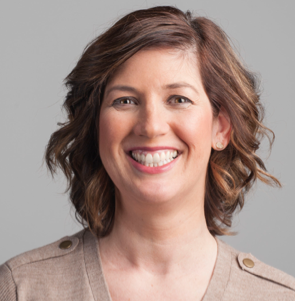As Director of Curriculum and Non-Degree Programs for Northwestern MSC, Amy ensures courses provide specific learning outcomes, helps students understand how courses connect to each other, and creates overall cohesion of the curriculum under an umbrella narrative all while designing and executing non-degree Executive Education workshops throughout the year.
What is your favorite aspect of MSC at Northwestern?
The people– the diversity and personalities of our professors and students. Most of our professors have been with us a decade or more and the program falls outside of normal teaching obligations, so all of our professors choose to teach with us. That says a lot about our professors, students, and program.
It brings a special sort of a family dynamic here where a diversity of outlooks is encouraged. For example, Professor Paul Arntson, who is one of our founders of the program has a very positive, democratic sort of ‘kumbaya’ leadership style, where he believes everybody has a place, whereas our Professor Mike Roloff is very pragmatic and has an ‘I will always believe the sky is falling until it doesn’t’ type of outlook. They are the best of friends and they have often taught in the same quarter, so students have both worldviews to navigate and it creates a fun, authentic, and interesting experience all around.
What makes Northwestern MSC different from other Masters Program?
Unlike other programs, Northwestern MSC is much broader in our student base and therefore our curriculum. For example, in an MBA program, the person next to you probably has similar job function to you, but at MSC you might be a person from finance who is sitting next to an attorney, or a nurse, etc. Understanding communication theory from so many different worldviews creates a very dynamic discourse in classroom.
Another difference is the element of introspection that is embedded in our curriculum in classes like the ‘Public Persuasion,’ a course that Professor Jason DeSanto teaches. He helps students work backwards from their work to their passion. He starts with a broad scope of what it is that motivates you, then dives deeper. For example, what is it about family that motivates you? This helps students identify their core values and how these can translate to other places in their lives. It is a team journey through the process, but it’s also very self-reflective for students, so you get both a personal and collaborative dynamic. Each student brings a unique element to the table.
Any generally interesting or unique research or projects that you specifically have been working on through the program that alumni or prospective students might like to know about?
We are working on relaunching the MSC Alumni Association and getting alumni more engaged. Over the last 18+ months, we’ve been rallying alumni to have a greater role in the program and in their MSC education. We have an executive education workshop series that is new this year. For example, we held a personal branding and network management workshop and recently hosted a crisis communication management open enrollment workshop. The Executive Education programming was born from alumni desire to continue and come back and learn more.
Our other major project is creating cohesion within the curriculum. When each person brings their own worldview and set of diverse experiences, they each absorb the information differently, which makes it hard to find a single core narrative for a graduate program.
Thus, we want to create a program narrative that has offshoots that are also personal. We are doing this by revising curriculum, the way we talk about it, and how we use metrics to measure our success. Doing so also helps in the marketplace, so that companies will begin to understand what they are getting when they hire someone with an MSC or send their leaders to MSC.
Looking from 1983 to today, managing complexity, collaborative leadership, and communication are the three themes that emerge from our curriculum. I have been working with professors to talk about each of their courses, and which of our three themes are key factors in what they teach. For instance, one course may be largely about managing complexity, whereas others might focus on collaborative leadership and communication. All of our core classes will have all three. We have also created a curriculum guide to also help students with creating their personal core narrative.
Moreover, my expertise is in curriculum studies and more specifically, on identity development. My research looks to answer questions like, how does an educational experience affect who you think you are and how does it change you? The co-curriculum and advising materials I have designed help students to think about and answer these types of question. So ultimately, we hope through these means students can talk more deeply about and better articulate what it is exactly that they’ve learned and how that has influenced them.
Why MSC for you?
As I helped to create workshops and co-curricular programming to support the MSC, I fell in love with the students and the culture.
One of the beautiful things about MSC program is it has been both reactive and proactive in reinventing itself. Originally it was a two-year program on Friday and Saturday. At one point, we had two concentrations: Communication Management and Communication Systems. Eventually we combined into one focus and one year, then it changed again this year to also include a hybrid delivery model. No matter what from the first graduating class in 1984 to now, mastering these three themes of managing complexity, collaborative leadership, and communication have resonated in organization and corporations – and it’s what our students do best.